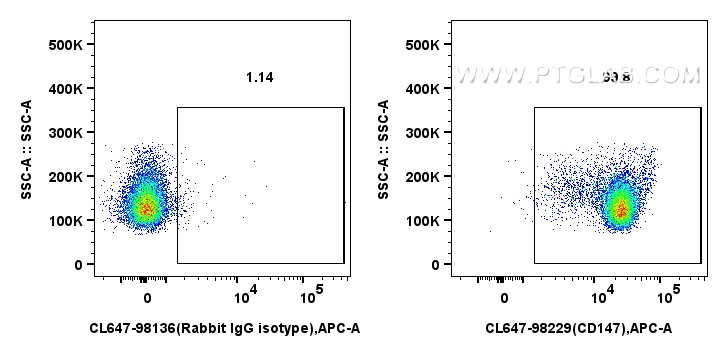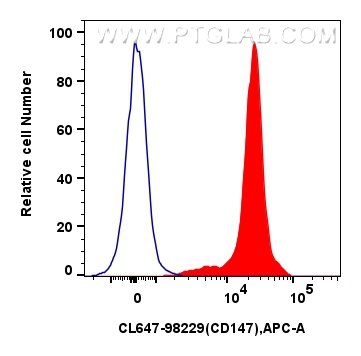验证数据展示
经过测试的应用
| Positive FC detected in | mouse thymocytes |
推荐稀释比
| 应用 | 推荐稀释比 |
|---|---|
| Flow Cytometry (FC) | FC : 0.25 ug per 10^6 cells in 100 μl suspension |
| This reagent has been tested for flow cytometric analysis. It is recommended that this reagent should be titrated in each testing system to obtain optimal results. | |
| Sample-dependent, Check data in validation data gallery. | |
产品信息
CL647-98229 targets CD147 in FC applications and shows reactivity with mouse samples.
| 经测试应用 | FC Application Description |
| 经测试反应性 | mouse |
| 免疫原 |
Recombinant protein 种属同源性预测 |
| 宿主/亚型 | Rabbit / IgG |
| 抗体类别 | Recombinant |
| 产品类型 | Antibody |
| 全称 | basigin |
| 别名 | 241852B4, Basic immunoglobulin superfamily, Basigin, Bsg, HT7 antigen |
| 计算分子量 | 42 kDa |
| GenBank蛋白编号 | NM_009768.2 |
| 基因名称 | CD147 |
| Gene ID (NCBI) | 12215 |
| 偶联类型 | CoraLite® Plus 647 Fluorescent Dye |
| 最大激发/发射波长 | 654 nm / 674 nm |
| 形式 | Liquid |
| 纯化方式 | Protein A purification |
| UNIPROT ID | P18572-1 |
| 储存缓冲液 | PBS with 0.09% sodium azide, pH 7.3. |
| 储存条件 | Store at 2-8°C. Avoid exposure to light. Stable for one year after shipment. |
背景介绍
CD147, also known as Basigin or extracellular matrix metalloproteinase inducer (EMMPRIN), is a transmembrane glycoprotein that belongs to the immunoglobulin superfamily (PMID: 7812975). The molecule is composed of an intracellular portion, an extracellular portion and a single transmembrane region. CD147 is expressed on a variety of cell types (e.g., hematopoietic, epithelial, and endothelial cells) and at varying levels (PMID: 32968061). CD147 is a pleiotropic molecule that plays an important role in fetal, neuronal, lymphocyte and extracellular matrix development (PMID: 17945211).
实验方案
| Product Specific Protocols | |
|---|---|
| FC protocol for CL Plus 647 CD147 antibody CL647-98229 | Download protocol |
| Standard Protocols | |
|---|---|
| Click here to view our Standard Protocols |



